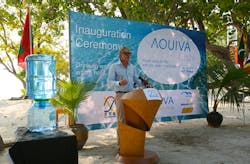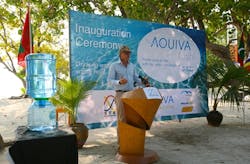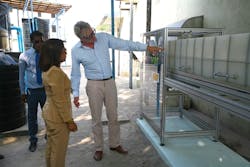Partnership to provide drinking water from waste heat in Maldive Islands
LONDON, ENGLAND, Feb. 18, 2014 -- Today, the world's first desalination unit utilizing the waste heat of a local power generator to produce up to 10 tons of drinking water per day through membrane distillation started up in the small Maldivian Island of Guhli.
The desalination plant taps into the cooling cycle of local diesel generators to retrieve the thermal heat that is otherwise wasted into the air. This waste heat of about 85 degrees Celsius drives a desalination process under vacuum using the membrane distillation modules of the German/Singaporean company memsys.
Accordingly, this robust process follows, in essence, the natural water cycle and results in distillate water of the highest purity. This distillate is then mineralized using local coral sand for a good Maldivian taste. It is distributed under the brand "AQUIVA fushi" -- fushi standing for the pure island taste created by coral sand in the mineralization process. The water is only available in reusable containers in order to prevent the pollution of the pristine Maldivian nature through the plastic waste of one-way bottles.The Island of Guhli, which measures approximately 600 by 300 meters, is home to about 1,200 inhabitants, a shipyard and a growing number of guesthouses. There are no natural sweet water sources other than seasonal rain, and therefore, Guhli was reliant on water imports. The water produced through this new technology will be used to reliably provide water for drinking, cooking and hygienic purposes.
The project was developed by the local power company STELCO in a joint venture with Aquiva Foundation, which won a tender in 2013 asking to desalinate water utilizing the waste heat available on all Maldivian Islands. "This project shows our efforts to provide environmentally-sustainable solutions, which improve the conditions for our people using breakthrough technologies," said the Maldivian Energy Minister Mr. Thoriq Ibrahim.
Florian Bollen, CEO of the Aquiva Foundation, added, "We believe that this is a good example of how water problems can be solved sustainably on a local level, even in situations where no sweet water is available. We are already working to apply this concept to many of the 200 inhabited islands of the Maldives, a number of Resort Islands, plus other nations." UN water expert Jehaan Saleem also said, "A good supply of safe drinking water has to be on top of the agenda of many small island nations since water-borne diseases are still one of the largest threats to the health of the people on earth."
Water-related diseases are common in the Maldives. Apart from its geographic isolation, factors that contribute to the disease burden include shortage of clean water, general lack of awareness among the public regarding the links between environment, clean water and personal health, water treatment and water sources. Therefore, improving access to safe water by developing sustainable systems that can be maintained by the island communities such as the "AQUIVA fushi" is crucial to improve health and well-being, particularly among the population in the atolls.
About Aquiva Foundation
The goal of the Aquiva Foundation is to provide people in developing countries with the tools needed to create long-term sustainable answers to their water needs. It is the first charity to focus on sustainable desalination of sea water and saline groundwater to avoid depletion of existing water sources. Aquiva employs a micro-finance approach, providing the technology, training and support needed to generate safe water for personal, industrial and agricultural use. For more information, visit www.aquiva-foundation.com.
###


